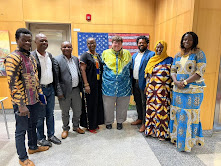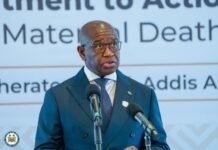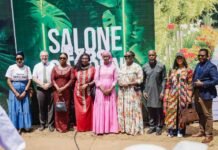By Amin Kef (Ranger)
The leadership of the Sierra Leone Association of Journalists (SLAJ) on Friday October 13, 2023 held a productive meeting with the United States Ambassador, Bryan David Hunt, at the US Embassy in Freetown. The discussions focused on SLAJ’s work, the media landscape in Sierra Leone and a range of industry challenges.
In his capacity as SLAJ President, Ahmed Sahid Nasralla, provided an insightful overview of SLAJ’s key accomplishments as well as ongoing challenges during his four-year tenure, emphasizing the historic repeal of the criminal libel law, which, he said, has paved the way for significant developments in the country’s media sector.
Nasralla pointed out notable achievements, such as the establishment of the SLAJ Golden Jubilee Journalism Welfare Fund, the National Fund for Public Interest Media, the Media Manifesto: “The Media We Want”, and the SLAJ Gender Equality Policy. Additionally, he highlighted the improved relations between the media and national security forces.
President Nasralla turned his attention to the crucial role played by SLAJ in preparing journalists for the national elections on June 24, 2023. He underlined the importance of training and capacity building for journalists across Sierra Leone, supported by various international donors, including the National Democratic Institute, the National Endowment for Democracy, the European Union through IDEA International, the Embassy of Ireland, UK Aid-FCDO, and UNDP. Nasralla also stressed the effectiveness of initiatives like the I-Verify platform and the NDI SuperNewsRoom in countering disinformation, misinformation, and hate speech during the elections.
However, President Nasralla expressed concern about the issue of “media poverty” in Sierra Leone, which he attributed to the proliferation of approximately 500 registered media outlets, many of which are small, one-person operations. While media pluralism is a democratic principle, Nasralla argued that in Sierra Leone, it might be counterproductive and undermine the media’s core function. He suggested that media outlets should consider merging, pooling resources, and establishing well-structured and professionally managed media houses that can produce high-quality content.
Ambassador Hunt was taken aback by the large number of media outlets in Sierra Leone and expressed his support for SLAJ’s efforts to promote consolidation within the media industry.
The Ambassador offered valuable insights and recommendations to SLAJ on several media-related issues:
1. Consolidation of the Media: Ambassador Hunt emphasized the importance of media consolidation, especially in a country as small as Sierra Leone. He suggested that the country could realistically support only a few print media houses and encouraged members and owners to focus on the economic viability of the media as a business. Hunt also stressed that not everyone should aspire to be an editor or media owner, as there are successful journalism careers that don’t involve ownership.
2. Editorship: Hunt highlighted the distinction between journalism and editorship, stating that they require different skill sets and career paths. He recommended changing the cultural perception that everyone in journalism must aspire to be an editor or media owner.
3. Standards: The Ambassador underscored the need for higher standards in the media and called for attention to issues such as passing editorials as news and not properly identifying paid advertising as such. He suggested working with the Independent Media Commission to enforce standards in a non-partisan manner.
4. Safety and Security of Journalists: Hunt stressed the importance of ensuring that journalists can carry out their work without fear of harassment, intimidation, or violence.
5. US Intervention: Ambassador Hunt expressed the US Government’s willingness to continue working with SLAJ to support initiatives like the I-Verify platform and the NDI SuperNewsRoom.
6. Making Media Viable: Hunt urged SLAJ to explore ways to make the media a viable business proposition and underscored the challenge of sustaining 500 different media outlets in a small economy like Sierra Leone’s.
7. Inclusion: The Ambassador emphasized the importance of inclusivity in journalism programs, especially in reaching historically disadvantaged communities, including women, to ensure equal benefits for all.
The meeting between SLAJ and Ambassador Hunt has laid the groundwork for further collaboration and progress in addressing critical media industry challenges in Sierra Leone. As the media landscape evolves, SLAJ and its partners, including the United States, are committed to improving journalism standards and media sustainability in the country.




